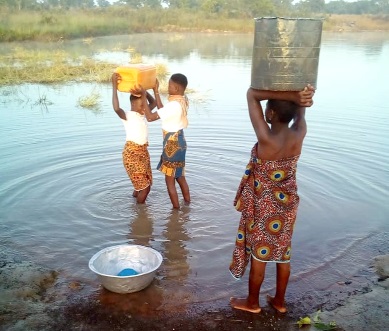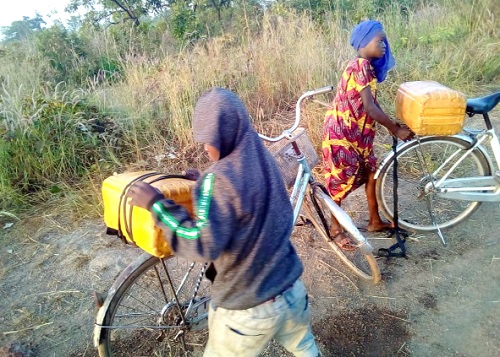
Climate crisis: A silent threat to education in northern Ghana
Ms. Zulfatu Yakubu a pupil of Wambung Primary School in the Yendi Municipality in the Northern Region, treks about five kilometres every day to fetch water from a nearby dugout.
Advertisement
She uses some of the water to bath for school while some is used for house chores such as washing, cooking and cleaning.
Fetching water every day before and after school has been a routine activity for her.
The situation becomes more worrying during the dry season as the few dugouts which serve the community often dry up, compelling the people to trek several kilometres in search of water.
Ms Zulfatu said she often gets to school late and very exhausted, which affects her academic activities.
“When I fetch the water before going to class, I always become very tired and can’t concentrate, and in the evening too I have to go round and search for water for the family,” she shared her ordeal to the Daily Graphic.
The story of Ms Zulfatu is not different from that of Yakubu Asana, a pupil of the Kpatorigu Primary School in the Mamprugu/Moaduri District in the North East Region.
She said during the dry season the only dugout the entire community depended on often dries up, compelling them to trek around in search of water.
"It is always not easy for us during the dry season. We always wake up very early to search for water to bath before going to school. It affects our education because you get to school late and very exhausted. You can’t even concentrate in class," she said.
Lack of water
Ms Zulfatu and Ms Asana are part of a number of school children in the Northern and North East Regions who struggle in search of water each day.
Lack of access to safe drinking water has been a major issue affecting effective teaching and learning in various schools in the area.
Some communities have dugouts which often dry up during harmattan season, whereas others with boreholes are unable to draw enough water due to low water table in area.
Checks by the Daily Graphic showed that while some communities did not have any proper water facility, others, which were fortunate to have boreholes, had them broken down for a very long time without being attended to.
For instance, in the Wambung community, there is only one borehole which was serving a population of about 1,000.
That had compelled the residents to compete with animals for water in a nearby dugout.
The situation is not different from that of the Kpandu and Jello communities in the North East Gonja District in the Savannah Region, as lack of access to potable water was affecting attendance and reporting time to school among school pupils.
The Head Teacher of Afayili Primary School in the Nanumba North Municipal, John Kpeiga, expressed worry about the situation and said “the students always have to walk a long distance to fetch water, and as a result, they are frequently late for school, others even sleep in class during lessons due to the tiredness”.

Besides the water situation, school children were also bearing the brunt of rainstorms.
For the past years, a number of school buildings have been destroyed by rainstorms.
Notably among the affected schools were the Lantenkpa Junior High School in the North-East Gonja District in the Savannah Region.
The situation brought academic activities to a halt as the roof of entire classrooms were ripped off completely.
Perennial floods
According to UNICEF, over 27 million children are at risk of devastating floods globally.
A large majority of these children affected by flooding in 2022 are among the most vulnerable and are at high risk of a multitude of threats including death by drowning, disease outbreaks, lack of safe drinking water, malnutrition, disruption in learning and violence.
The aftermath of floods is often more deadly for children than the extreme weather events that caused the flooding.
In the Wambung and Kpatorigu communities, schoolchildren have been enduring the impact of perennial floods for many years.
Pupils like Ms Zulfatu and Ms Asana are unable to go to school when parts of their communities gets flooded.
Climate crisis
The persistent draught, floods and rainstorms being experienced in the various communities in the north are glaring consequences of climate change.
These are as a result of the fast depletion of the fragile vegetation cover by human activities such as indiscriminate tree felling and destruction of water bodies.
For instance, the Yendi Municipality which is the second largest in the region, registers poor annual rainfall culminating in poor yields which can bring about food insecurity and poverty.

Aside from the stress the schoolchildren go through to access water and consequences of the rainstorm and floods, they are also bearing the additional burden of conditions related to climate crisis, compromising their physical and physiological development.
Checks in some health facilities in the communities showed that typhoid fever and diarrhoea which was largely spread through contaminated food and water covered about 60 per cent of Out-Patients Department (OPD) cases.
Experts have linked the detrimental effects of water pollution on health to lower academic performance.
This is because school attendance may decrease due to the effects of diarrhoea disruption and other related illnesses.
Worrying situation
The Assemblyman for the Kunkun Electoral Area, Danaa George, expressed worry about the situation and said schools in the area were not having access to safe drinking water.
He noted that "apart from the few boreholes in the communities and the dugouts the community members share with animals, the schools don't have boreholes for the schoolchildren to even drink”.
He, therefore, appealed to the government and Non-governmental Organisations to come to the aid of the people by providing them with potable water to ameliorate their plight, particularly schoolchildren.
Corroborating the assertion, the Public Relations Officer of the Yendi Municipal Directorate of the Ghana Education Service (GES), Benjamin Opoku Manu, described the situation as an affront to education in the area.
"In fact, climate change is having a toll on education in the municipality, pupils spend several hours searching for water and by the time they get to school they are tired. In the raining season too, floods always cut off most of the communities, which makes it difficult for both teachers and pupils to go to school," he lamented.
Advocacy
In the midst of the situation, School for Life, an education-centred non-governmental organisation, has been leading a campaign to raise awareness of the growing threat of climate change on education in the country, particularly in the northern region.
Through its Citizen-led Educational Accountability and Responsiveness in Ghana (CLEAR) project, the NGO is building the capacity of the community members and the assemblies to find lasting solution to the challenges.
In an interview with the Daily Graphic, the Advocacy and Policy Influencing Specialist at School for Life, Amadu Zulyaden, said the impact of Climate Change on the development of Ghana, particularly on education could not be underestimated.
“For us in education, the impact could be direr if urgent measures aren’t taken to curb the impact of the menace. Schoolchildren often trek long distances in search of water to bath before going to school. This makes them report to school late and even some are unable to go due to tiredness from the long distances covered.

For quality education to be achieved, learning spaces must be conducive and welcoming but most schools are faced with ripped off classrooms situations due to storms resulting from the climate impact,” he noted.
He, therefore, called on communities and local authorities to step up efforts aimed at raising awareness and introducing measures to address the worrying impact of the climate crisis.
Climate education
Since the launch of Ghana’s National Climate Change and Green Economy Learning Strategy in 2016, the country has taken important steps to integrate climate change into the general education system.
At the COP26 summit in Glasgow, United Kingdom in 2021, Ghana’s Deputy Minister of Education, Rev. John Ntim Fordjour, said the sector was the hardest hit when climate-induced disasters such as floods, storms and drought occurred, hence the need to introduce children to the nuances of the phenomena to build their resilience.
“Educational sector is always at the receiving end of disasters. When there is drought, children trek long distances in search of water. They are unable to go to school when a storm rips off roofs of their school building,” he said.
He noted that over the years, not much attention had been focused on the impact of climate change on education both at the local and international level, explaining that many children especially females had had their education truncated as a result of climate change induced disasters.
Rev. Fordjour, however, reiterated the country’s commitment towards increasing the contribution of education to building a more just and sustainable world through the implementation of education for sustainable development by 2030.
It is an undeniable fact that climate crisis is biting harder on education than we may be anticipating.
For schoolchildren like Zulfatu and Asana, their only wish is for quality and inclusive education which is being threatened by the climatic conditions.
To address the growing situation, there is therefore the need for authorities to step up efforts to raise awareness and initiate measures to mitigate the impact of climate change.
Also, climate education should be intensified in various schools to sensitise school children and bring them on board in the fight against the menace.
Until then, there is no guarantee that there would be the desired progress in ensuring that Ghana achieves the Sustainable Development Goal 4 (SDG4) which calls for quality and inclusive education for all.
Writer’s email:[email protected]




